01 Aug 17 | Mapping Media Freedom, Media Freedom, media freedom featured, News and features, Russia
[vc_row][vc_column][vc_single_image image=”91601″ img_size=”full” add_caption=”yes”][vc_column_text]
As thousands of people took to the streets across Russia on 12 June 2017 to protest corruption, journalists were among those detained by police, according to verified incidents reported to Mapping Media Freedom.
The Russia Day demonstrations followed calls from the Foundation Against Corruption, an NGO headed by political opposition leader Aleksei Navalny. Rallies took place across the country, with the largest gatherings taking place in Moscow and St Petersburg.
According to OVD-INFO, an independent police monitoring website, at least 1,769 people were detained in 31 cities throughout the day. Rights groups also registered serious human rights violations. The largest number of arrests took place in St Petersburg where roughly 700 people were detained. Around 200 of the detainees were minors who were released after their parents intervened. Russian authorities can hold individuals for 48 hours before they are arrested.
Another 150 demonstrators were sentenced to administrative arrest of up to 15 days in detention, and yet others received fines of between 10,500 and 15,000 rubles (€150 to €250).
Journalists were threatened and detained throughout the country.
[/vc_column_text][/vc_column][/vc_row][vc_row][vc_column][vc_separator][vc_row_inner][vc_column_inner width=”1/2″][vc_column_text]
Index on Censorship monitors press freedom in Russia and 41 other European area nations.
As of 31/07/2017, there were 361 verified reports of media freedom violations associated with Russia in the Mapping Media Freedom database.[/vc_column_text][/vc_column_inner][vc_column_inner width=”1/2″][vc_column_text]
My 30 hours in detention
As an independent journalist, I was one of the media professionals detained by police at the St Petersburg rally. I was taken to a police station and held with 40 other people for 30 hours before being fined 10,500 rubles (€150) for participating in an illegal demonstration. I am appealing the court’s decision.
— Andrey Kalikh, Mapping Media Freedom
[/vc_column_text][/vc_column_inner][/vc_row_inner][vc_separator][/vc_column][/vc_row][vc_row][vc_column][vc_column_text]
In Moscow, Andrey Poznaykov, a reporter for the Echo of Moscow radio station covering the demonstrations, was detained while he was taking a break on a cafe’s terrace. Though he showed officers his press card, he was taken to a police van and released soon after.
Other detainees in Moscow include: Novaya Gazeta photographer Evgeni Feldman, a correspondent for Open Russia Nikita Safronov, independent photographer Georgi Malets and independent journalist Denis Styazhkin. Aleksei Abanin, a photographer for the RTVi, wrote later that a police officer had threatened “to break my camera and break my face if I continue to photograph.”
Ignacio Ortega, a Moscow-based reporter for Spanish news agency EFE, was also detained while he was reporting from the anti-corruption rally. Officers held Ortega in a van with dozens of other individuals before bringing him and the others to a police station. Ortega was released after he identified himself at the station, EFE reported.
Blogger Yan Katelevski said that he was physically assaulted by police officers while being detained: “They dropped my press card, kicked me and hit me with batons, grabbed me by the throat, and beat me on my head while I was on a police bus”.
In Sochi, Andrey Kiselyov, a correspondent for Radio RFE/RL, was detained and issued him a warning to not commit any further legal violations.
In Makhachkala, Dagestan, Caucasian Knot journalist Patimat Makhmudova said that unknown people had broken her camera during the 12 June protests. Additionally, Bariyat Idrisova and Saida Vagabova, correspondents for the independent Dagestani news website Chernovik were assaulted and prevented from filming at the same anti-corruption rally, Chernovik reported.
In Saratov, an unknown person attempted to prevent filming by correspondents from the Open Channel, a local TV station. The unknown individual approached the TV crew, asked whether everything was OK and then tried to run away with the camera.
Among those who were detained were David Frenkel, a contributing photographer for Kommersant and Mediazona, and Ksenia Morozova, the journalist for local website Sobaka.ru, who were both covering the rally. Both journalists were detained despite showing their press cards.
Frenkel was soon released while Morozova was taken to the police station, where she was kept overnight before facing a trial for “public order disturbance”. After spending 35 hours in the police station, Morozova was brought to the court for trial. She was sentenced to 10 days administrative arrest and a fine of 15,000 rubles (€250). The court argued that Morozova had no “accreditation” to work at the protest.
The Russian Union of Journalists (UJ) released a statement condemning the harsh police actions taken at the anti-corruption rallies across the country. The UJ demanded the release of all detained journalists and sent an appeal to the Chief Police Department of the Ministry of Interior. The head of the journalists’ union Pavel Gusev stated in his interview that the police had disturbed journalists from accomplishing their professional duties.
The St. Petersburg Ombudsman Aleksandr Shyshlov also issued a press release condemning police actions during the rallies where “hundreds of people were detained, among them minors, media representatives, observers and passing civilians who did not commit any unlawful actions”.
[/vc_column_text][/vc_column][/vc_row][vc_row][vc_column][vc_column_text]
Mapping Media Freedom
Click on the bubbles to view reports or double-click to zoom in on specific regions. The full site can be accessed at https://mappingmediafreedom.org/[/vc_column_text][/vc_column][/vc_row]
31 Jul 17 | Events
[vc_row][vc_column][vc_video link=”https://youtu.be/EbGIEmUhbLQ”][vc_column_text]Centre for Turkey Studies (CEFTUS), a London-based non-profit organisation that organises monthly events in London dedicated to Turkey, will be holding the sixth Annual Turkish, Kurdish and Turkish Cypriot Community Achievement Awards at the CEFTUS Anniversary Gala on 8 October. Index on Censorship is proud to be a partner in supporting this event.
CEFTUS is seeking nominations for the awards. If you know a Turk, Kurd or Turkish Cypriot who deserves recognition for their hard work in the community then we invite you to nominate them for an award. You can do this by filling out a nomination form with the name, contact details and a reason why you think your nominee qualifies them for an award. To fill out the form, please follow this link.
The categories are listed below:
Female /Male Role Model
Politics and Education
Law Firm/Lawyers
Community Organisations/Charity
Businessman of the year
Businesswoman of the year
Food and restaurants
Financial Services/Accountancy
Wholesalers/Production/best Employer
Young Entrepreneurs
More information about the CEFTUS Anniversary Gala can be found here.[/vc_column_text][/vc_column][/vc_row][vc_row][vc_column][vc_column_text]
When: Sunday 8 October 2017 18:00-23:00
Where: Westminster Park Plaza Hotel, 200 Westminister Bridge Rd, Lambeth, London SE1 7UT
Tickets: Via CEFTUS
[/vc_column_text][/vc_column][/vc_row]
31 Jul 17 | Awards
[vc_row][vc_column][vc_empty_space height=”5px”][vc_custom_heading text=”Freedom of Expression Awards Fellowship” font_container=”tag:h1|text_align:center” use_theme_fonts=”yes”][vc_custom_heading text=”Submit your nomination now” font_container=”tag:h3|text_align:center|color:%23dd3333″ use_theme_fonts=”yes” link=”url:%23nomination|||”][vc_empty_space height=”5px”][vc_row_inner][vc_column_inner width=”1/2″][vc_column_text]
Winners of the Freedom of Expression Awards Fellowship receive 12 months of capacity building, coaching and strategic support. Through the fellowships, Index seeks to maximise the impact and sustainability of voices at the forefront of pushing back censorship worldwide.
[/vc_column_text][/vc_column_inner][vc_column_inner width=”1/2″][vc_video link=”https://youtu.be/z4ZEuybB5Vc” align=”center”][/vc_column_inner][/vc_row_inner][/vc_column][/vc_row][vc_row][vc_column][vc_column_text]
The nomination period for the 2019 Freedom of Expression Awards Fellowship is now open.
The Freedom of Expression Awards Fellowship programme offers 12 months of support to individuals or organisations fighting to defeat censorship worldwide. Fellows receive assistance throughout the year, beginning with an all-expenses-paid training week in London. The Fellowship is an opportunity to build new skills and to network with other groups fighting for similar causes. The Fellowship encourages collaboration, helps maximise ongoing work and supports sustainability. The Fellowship is an enriching, one-of-a-kind experience in which fellows become part of a supportive worldwide community of free expression champions.
All information submitted as part of the nomination process will be held in strict confidence and used only in connection with the nomination. Your information will not be shared, sold or transferred to any party outside of Index or the nominations process. Your information will not be held after the nominations process is complete.[/vc_column_text][gravityform id=”23″ title=”false” description=”false” ajax=”false”][/vc_column][/vc_row][vc_row equal_height=”yes”][vc_column][vc_empty_space height=”5px”][vc_custom_heading text=”2019 Freedom of Expression Awards Fellowship Timeline” font_container=”tag:h3|text_align:center” use_theme_fonts=”yes”][vc_row_inner equal_height=”yes” el_class=”awards-timeline-grid”][vc_column_inner width=”1/6″][vc_single_image image=”80944″ img_size=”full”][vc_column_text]25 JUN – 30 SEP 2018
NOMINATIONS[/vc_column_text][/vc_column_inner][vc_column_inner width=”1/6″][vc_single_image image=”80945″ img_size=”full”][vc_column_text]DEC 2018
JUDGING PANEL ANNOUNCED[/vc_column_text][/vc_column_inner][vc_column_inner width=”1/6″][vc_single_image image=”80946″ img_size=”full”][vc_column_text]JAN 2018
SHORTLIST ANNOUNCED[/vc_column_text][/vc_column_inner][vc_column_inner width=”1/6″][vc_single_image image=”80947″ img_size=”full”][vc_column_text]1-5 APR 2019
AWARDS FELLOWSHIP WEEK[/vc_column_text][/vc_column_inner][vc_column_inner width=”1/6″][vc_single_image image=”80948″ img_size=”full”][vc_column_text]4 APR 2019
AWARDS GALA[/vc_column_text][/vc_column_inner][vc_column_inner width=”1/6″][vc_single_image image=”80949″ img_size=”full”][vc_column_text]APR 2019 – MAR 2020
AWARDS FELLOWSHIP[/vc_column_text][/vc_column_inner][/vc_row_inner][vc_empty_space][/vc_column][/vc_row][vc_row full_width=”stretch_row”][vc_column][vc_custom_heading text=”About the Awards Fellowship” font_container=”tag:h3|text_align:center” use_theme_fonts=”yes”][vc_row_inner equal_height=”yes” el_class=”awards-timeline-grid”][vc_column_inner width=”1/6″][vc_single_image image=”94804″ img_size=”full”][/vc_column_inner][vc_column_inner width=”1/6″][vc_column_text]One Full Year
Fellows receive 12 months of direct assistance, starting with an all-expenses-paid training week in London in April 2018.[/vc_column_text][/vc_column_inner][vc_column_inner width=”1/6″][vc_column_text]Survive
Index helps fellows build key partnerships, troubleshoot and receive expert support in multiple areas including personal safety, finance, PR and mental health.[/vc_column_text][/vc_column_inner][vc_column_inner width=”1/6″][vc_column_text]Thrive
Fellows work with Index and partners to identify and realise key strategic goals.[/vc_column_text][/vc_column_inner][vc_column_inner width=”1/6″][vc_column_text]Amplify
Index promotes news and regional developments through our magazine, website and social media.[/vc_column_text][/vc_column_inner][vc_column_inner width=”1/6″][vc_column_text]Network
Fellows become part of a supportive community of free expression champions worldwide.[/vc_column_text][/vc_column_inner][/vc_row_inner][vc_custom_heading text=”What we look for in selecting Awards Fellows” font_container=”tag:h3|text_align:center” use_theme_fonts=”yes”][vc_row_inner equal_height=”yes” el_class=”awards-timeline-grid”][vc_column_inner width=”1/6″][vc_single_image image=”94805″ img_size=”full”][/vc_column_inner][vc_column_inner width=”1/6″][vc_column_text]Timeliness
A significant contribution within the past 12 months.[/vc_column_text][/vc_column_inner][vc_column_inner width=”1/6″][vc_column_text]Resilience
Courage to speak out, persisting in the face of adversity.[/vc_column_text][/vc_column_inner][vc_column_inner width=”1/6″][vc_column_text]Innovation
Creative ways of promoting free expression or circumventing censorship.[/vc_column_text][/vc_column_inner][vc_column_inner width=”1/6″][vc_column_text]Impact
Evidence of shifting perceptions, influencing public or government opinion, contributing to legislative change.[/vc_column_text][/vc_column_inner][vc_column_inner width=”1/6″][vc_column_text]Need
Those cases where the 2018 Awards Fellowship can potentially add the most value.[/vc_column_text][/vc_column_inner][/vc_row_inner][vc_custom_heading text=”We award Fellowships in four categories” font_container=”tag:h3|text_align:center” use_theme_fonts=”yes”][vc_row_inner equal_height=”yes” el_class=”text_white”][vc_column_inner width=”1/4″ css=”.vc_custom_1501508115518{background-color: #cb3000 !important;}”][vc_custom_heading text=”Arts” font_container=”tag:h3|text_align:left” use_theme_fonts=”yes”][vc_column_text]for artists and arts producers whose work challenges repression and injustice and celebrates artistic free expression[/vc_column_text][/vc_column_inner][vc_column_inner width=”1/4″ css=”.vc_custom_1501508268476{background-color: #d98c00 !important;}”][vc_custom_heading text=”Campaigning” font_container=”tag:h3|text_align:left” use_theme_fonts=”yes”][vc_column_text]for activists and campaigners who have had a marked impact in fighting censorship and promoting freedom of expression[/vc_column_text][/vc_column_inner][vc_column_inner width=”1/4″ css=”.vc_custom_1501508309950{background-color: #cb3000 !important;}”][vc_custom_heading text=”Digital Activism” font_container=”tag:h3|text_align:left” use_theme_fonts=”yes”][vc_column_text]for innovative uses of technology to circumvent censorship and enable free and independent exchange of information[/vc_column_text][/vc_column_inner][vc_column_inner width=”1/4″ css=”.vc_custom_1501508333043{background-color: #d98c00 !important;}”][vc_custom_heading text=”Journalism” font_container=”tag:h3|text_align:left” use_theme_fonts=”yes”][vc_column_text]for courageous, high-impact and determined journalism that exposes censorship and threats to free expression[/vc_column_text][/vc_column_inner][/vc_row_inner][vc_empty_space height=”15px”][/vc_column][/vc_row][vc_row full_width=”stretch_row” css=”.vc_custom_1504188991311{background-color: #f2f2f2 !important;}”][vc_column][vc_tta_tabs color=”white” active_section=”1″][vc_tta_section title=”2018 Fellows” tab_id=”1501506166658-bae3c112-ebd9″][vc_custom_heading text=”Campaigning” font_container=”tag:h4|text_align:center” use_theme_fonts=”yes” link=”url:https%3A%2F%2Fwww.indexoncensorship.org%2Fnewsite02may%2F2017%2F04%2Fcampaigning-fellow-2017%2F|||”][vc_row_inner][vc_column_inner][vc_custom_heading text=”2018 Fellows” font_container=”tag:h2|text_align:center” use_theme_fonts=”yes”][vc_column_text]
Selected from over 400 public nominations and a shortlist of 16, the 2018 Freedom of Expression Awards Fellows exemplify courage in the face of censorship. Learn more about the fellowship.
[/vc_column_text][/vc_column_inner][/vc_row_inner][vc_row_inner][vc_column_inner width=”1/4″][vc_custom_heading text=”Arts” font_container=”tag:h4|text_align:center” use_theme_fonts=”yes” link=”url:https%3A%2F%2Fwww.indexoncensorship.org%2Fnewsite02may%2F2017%2F04%2Farts-fellow-2017%2F|||”][vc_custom_heading text=”Museum of Dissidence” font_container=”tag:h4|text_align:center” use_theme_fonts=”yes” link=”url:https%3A%2F%2Fwww.indexoncensorship.org%2Fnewsite02may%2F2018%2F04%2Farts-fellow-2018%2F|||”][vc_single_image image=”97994″ img_size=”full” alignment=”center” onclick=”custom_link” link=”https://www.indexoncensorship.org/newsite02may/2018/04/arts-fellow-2018/”][/vc_column_inner][vc_column_inner width=”1/4″][vc_custom_heading text=”Campaigning” font_container=”tag:h4|text_align:center” use_theme_fonts=”yes” link=”url:https%3A%2F%2Fwww.indexoncensorship.org%2Fnewsite02may%2F2017%2F04%2Farts-fellow-2017%2F|||”][vc_custom_heading text=”ECRF” font_container=”tag:h4|text_align:center” use_theme_fonts=”yes” link=”url:https%3A%2F%2Fwww.indexoncensorship.org%2Fnewsite02may%2F2018%2F04%2Fcampaigning-fellow-2018%2F|||”][vc_single_image image=”97988″ img_size=”full” alignment=”center” onclick=”custom_link” link=”https://www.indexoncensorship.org/newsite02may/2018/04/campaigning-fellow-2018/”][vc_column_text]The 2018 Campaigning Award is supported by Doughty Street Chambers[/vc_column_text][/vc_column_inner][vc_column_inner width=”1/4″][vc_custom_heading text=”Digital Activism” font_container=”tag:h4|text_align:center” use_theme_fonts=”yes” link=”url:https%3A%2F%2Fwww.indexoncensorship.org%2Fnewsite02may%2F2017%2F04%2Fdigital-activism-2017%2F|||”][vc_custom_heading text=”Habari RDC” font_container=”tag:h4|text_align:center” use_theme_fonts=”yes” link=”url:https%3A%2F%2Fwww.indexoncensorship.org%2Fnewsite02may%2F2018%2F04%2Fdigital-activism-2018%2F|||”][vc_single_image image=”97990″ img_size=”full” alignment=”center” onclick=”custom_link” link=”https://www.indexoncensorship.org/newsite02may/2018/04/digital-activism-2018/”][vc_column_text]The 2018 Digital Activism Award is sponsored by Private Internet Access[/vc_column_text][/vc_column_inner][vc_column_inner width=”1/4″][vc_custom_heading text=”Journalism” font_container=”tag:h4|text_align:center” use_theme_fonts=”yes” link=”url:https%3A%2F%2Fwww.indexoncensorship.org%2Fnewsite02may%2F2017%2F04%2Fjournalism-2017%2F|||”][vc_custom_heading text=”Wendy Funes” font_container=”tag:h4|text_align:center” use_theme_fonts=”yes” link=”url:https%3A%2F%2Fwww.indexoncensorship.org%2Fnewsite02may%2F2018%2F04%2Fjournalism-2018%2F|||”][vc_single_image image=”98000″ img_size=”full” alignment=”center” onclick=”custom_link” link=”https://www.indexoncensorship.org/newsite02may/2018/04/journalism-2018/”][vc_column_text]The 2018 Journalism Award is sponsored by Vice News[/vc_column_text][/vc_column_inner][/vc_row_inner][three_column_post title=”2018 Fellows News” category_id=”23707″][/vc_tta_section][vc_tta_section title=”2017 Fellows” tab_id=”1524472475785-d2464a89-c53e”][vc_row_inner][vc_column_inner][vc_custom_heading text=”2017 Fellows” font_container=”tag:h2|text_align:center” use_theme_fonts=”yes”][vc_column_text]
Selected from over 400 public nominations and a shortlist of 16, the 2017 Freedom of Expression Awards Fellows exemplify courage in the face of censorship. Learn more about the fellowship.
[/vc_column_text][/vc_column_inner][/vc_row_inner][vc_row_inner][vc_column_inner width=”1/4″][vc_custom_heading text=”Arts” font_container=”tag:h4|text_align:center” use_theme_fonts=”yes” link=”url:https%3A%2F%2Fwww.indexoncensorship.org%2Fnewsite02may%2F2017%2F04%2Farts-fellow-2017%2F|||”][vc_custom_heading text=”Rebel Pepper” font_container=”tag:h4|text_align:center” use_theme_fonts=”yes” link=”url:https%3A%2F%2Fwww.indexoncensorship.org%2Fnewsite02may%2F2017%2F04%2Farts-fellow-2017%2F|||”][vc_single_image image=”94724″ img_size=”full” alignment=”center” onclick=”custom_link” link=”https://www.indexoncensorship.org/newsite02may/2017/04/arts-fellow-2017/”][/vc_column_inner][vc_column_inner width=”1/4″][vc_custom_heading text=”Campaigning” font_container=”tag:h4|text_align:center” use_theme_fonts=”yes” link=”url:https%3A%2F%2Fwww.indexoncensorship.org%2Fnewsite02may%2F2017%2F04%2Fcampaigning-fellow-2017%2F|||”][vc_custom_heading text=”Ildar Dadin” font_container=”tag:h4|text_align:center” use_theme_fonts=”yes” link=”url:https%3A%2F%2Fwww.indexoncensorship.org%2Fnewsite02may%2F2017%2F04%2Fcampaigning-fellow-2017%2F|||”][vc_single_image image=”94725″ img_size=”full” alignment=”center” onclick=”custom_link” link=”https://www.indexoncensorship.org/newsite02may/2017/04/campaigning-fellow-2017/”][vc_column_text]The 2017 Campaigning Award is supported by Doughty Street Chambers[/vc_column_text][/vc_column_inner][vc_column_inner width=”1/4″][vc_custom_heading text=”Digital Activism” font_container=”tag:h4|text_align:center” use_theme_fonts=”yes” link=”url:https%3A%2F%2Fwww.indexoncensorship.org%2Fnewsite02may%2F2017%2F04%2Fdigital-activism-2017%2F|||”][vc_custom_heading text=”Turkey Blocks” font_container=”tag:h4|text_align:center” use_theme_fonts=”yes” link=”url:https%3A%2F%2Fwww.indexoncensorship.org%2Fnewsite02may%2F2017%2F04%2Fdigital-activism-2017%2F|||”][vc_single_image image=”94726″ img_size=”full” alignment=”center” onclick=”custom_link” link=”https://www.indexoncensorship.org/newsite02may/2017/04/digital-activism-2017/”][vc_column_text]The 2017 Digital Activism Award is sponsored by Private Internet Access[/vc_column_text][/vc_column_inner][vc_column_inner width=”1/4″][vc_custom_heading text=”Journalism” font_container=”tag:h4|text_align:center” use_theme_fonts=”yes” link=”url:https%3A%2F%2Fwww.indexoncensorship.org%2Fnewsite02may%2F2017%2F04%2Fjournalism-2017%2F|||”][vc_custom_heading text=”Maldives Independent” font_container=”tag:h4|text_align:center” use_theme_fonts=”yes” link=”url:https%3A%2F%2Fwww.indexoncensorship.org%2Fnewsite02may%2F2017%2F04%2Fjournalism-2017%2F|||”][vc_single_image image=”94727″ img_size=”full” alignment=”center” onclick=”custom_link” link=”https://www.indexoncensorship.org/newsite02may/2017/04/journalism-2017/”][vc_column_text]The 2017 Journalism Award is sponsored by CNN[/vc_column_text][/vc_column_inner][/vc_row_inner][three_column_post title=”2017 Fellows News” category_id=”15965″][/vc_tta_section][vc_tta_section title=”2016 Fellows” tab_id=”1501487515382-d17ff4cd-299e”][vc_row_inner][vc_column_inner width=”1/6″][vc_custom_heading text=”2016 Fellows” font_container=”tag:h3|text_align:left” use_theme_fonts=”yes”][/vc_column_inner][vc_column_inner width=”1/6″][vc_custom_heading text=”Arts | Murad Subay” font_container=”tag:h4|text_align:center” use_theme_fonts=”yes” link=”url:https%3A%2F%2Fwww.indexoncensorship.org%2Fnewsite02may%2F2016%2F11%2Farts-fellow-2016%2F|||”][vc_single_image image=”74790″ img_size=”full” alignment=”center” onclick=”custom_link” link=”https://www.indexoncensorship.org/newsite02may/2016/11/arts-fellow-2016/”][/vc_column_inner][vc_column_inner width=”1/6″][vc_custom_heading text=”Campaigning | Bolo Bhi” font_container=”tag:h4|text_align:center” use_theme_fonts=”yes” link=”url:https%3A%2F%2Fwww.indexoncensorship.org%2Fnewsite02may%2F2016%2F03%2Fcampaigning-2016%2F|||”][vc_single_image image=”82685″ img_size=”full” alignment=”center” onclick=”custom_link” link=”https://www.indexoncensorship.org/newsite02may/2016/03/campaigning-2016/”][/vc_column_inner][vc_column_inner width=”1/6″][vc_custom_heading text=”Digital Activism | GreatFire” font_container=”tag:h4|text_align:center” use_theme_fonts=”yes” link=”url:https%3A%2F%2Fwww.indexoncensorship.org%2Fnewsite02may%2F2016%2F03%2Fdigital-activism-2016%2F|||”][vc_single_image image=”82689″ img_size=”full” alignment=”center” onclick=”custom_link” link=”https://www.indexoncensorship.org/newsite02may/2016/03/digital-activism-2016/”][/vc_column_inner][vc_column_inner width=”1/6″][vc_custom_heading text=”Journalism | Zaina Erhaim” font_container=”tag:h4|text_align:center” use_theme_fonts=”yes” link=”url:https%3A%2F%2Fwww.indexoncensorship.org%2Fnewsite02may%2F2016%2F03%2Fjournalism-2016%2F|||”][vc_single_image image=”82702″ img_size=”full” alignment=”center” onclick=”custom_link” link=”https://www.indexoncensorship.org/newsite02may/2016/03/journalism-2016/”][/vc_column_inner][vc_column_inner width=”1/6″][vc_custom_heading text=”Music in Exile | Smockey” font_container=”tag:h4|text_align:center” use_theme_fonts=”yes” link=”url:https%3A%2F%2Fwww.indexoncensorship.org%2Fnewsite02may%2F2016%2F03%2Fmusic-in-exile-2016%2F|||”][vc_single_image image=”81098″ img_size=”full” alignment=”center” onclick=”custom_link” link=”https://www.indexoncensorship.org/newsite02may/2016/03/music-in-exile-2016/”][/vc_column_inner][/vc_row_inner][three_column_post title=”2016 Fellows News” category_id=”16122″][/vc_tta_section][vc_tta_section title=”2015 Fellows” tab_id=”1501487515639-5231aa25-0705″][vc_row_inner][vc_column_inner width=”1/6″][vc_custom_heading text=”2015 Fellows” font_container=”tag:h3|text_align:center” use_theme_fonts=”yes”][/vc_column_inner][vc_column_inner width=”1/6″][vc_custom_heading text=”Arts | El Haqed” font_container=”tag:h4|text_align:center” use_theme_fonts=”yes” link=”url:https%3A%2F%2Fwww.indexoncensorship.org%2Fnewsite02may%2F2015%2F03%2Farts-2015%2F|||”][vc_single_image image=”81111″ img_size=”full” alignment=”center” onclick=”custom_link” link=”https://www.indexoncensorship.org/newsite02may/2015/03/arts-2015/”][/vc_column_inner][vc_column_inner width=”1/6″][vc_custom_heading text=”Campaigning | Amran Abdundi” font_container=”tag:h4|text_align:center” use_theme_fonts=”yes” link=”url:https%3A%2F%2Fwww.indexoncensorship.org%2Fnewsite02may%2F2015%2F03%2Fcampaigning-2015%2F|||”][vc_single_image image=”81118″ img_size=”full” alignment=”center” onclick=”custom_link” link=”https://www.indexoncensorship.org/newsite02may/2015/03/campaigning-2015/”][/vc_column_inner][vc_column_inner width=”1/6″][vc_custom_heading text=”Digital Activism | Tamás Bodoky” font_container=”tag:h4|text_align:center” use_theme_fonts=”yes” link=”url:https%3A%2F%2Fwww.indexoncensorship.org%2Fnewsite02may%2F2015%2F03%2Fdigital-activism-2015%2F|||”][vc_single_image image=”81126″ img_size=”full” alignment=”center” onclick=”custom_link” link=”https://www.indexoncensorship.org/newsite02may/2015/03/digital-activism-2015/”][/vc_column_inner][vc_column_inner width=”1/6″][vc_custom_heading text=”Journalism | Rafael Marques de Morais” font_container=”tag:h4|text_align:center” use_theme_fonts=”yes” link=”url:https%3A%2F%2Fwww.indexoncensorship.org%2Fnewsite02may%2F2015%2F03%2Fjournalism-2015%2F|||”][vc_single_image image=”81131″ img_size=”full” alignment=”center” onclick=”custom_link” link=”https://www.indexoncensorship.org/newsite02may/2015/03/journalism-2015/”][/vc_column_inner][vc_column_inner width=”1/6″][vc_custom_heading text=”Journalism | Safa Al Ahmad” font_container=”tag:h4|text_align:center” use_theme_fonts=”yes” link=”url:https%3A%2F%2Fwww.indexoncensorship.org%2Fnewsite02may%2F2015%2F03%2Fjournalism-2015-2%2F|||”][vc_single_image image=”81138″ img_size=”full” alignment=”center” onclick=”custom_link” link=”https://www.indexoncensorship.org/newsite02may/2015/03/journalism-2015-2/”][/vc_column_inner][/vc_row_inner][three_column_post title=”2015 Fellows News” category_id=”16123″][/vc_tta_section][/vc_tta_tabs][/vc_column][/vc_row][vc_row][vc_column][vc_separator color=”black”][vc_row_inner equal_height=”yes”][vc_column_inner width=”1/2″][vc_custom_heading text=”Support the Index Awards.” font_container=”tag:p|font_size:28|text_align:center” use_theme_fonts=”yes” link=”url:https%3A%2F%2Fwww.indexoncensorship.org%2Fnewsite02may%2Fsupport-the-freedom-of-expression-awards%2F|||”][vc_column_text]
By donating to the Freedom of Expression Awards you help us support individuals and groups at the forefront of tackling censorship.
Find out more
[/vc_column_text][/vc_column_inner][vc_column_inner width=”1/2″ css=”.vc_custom_1528707303361{background-image: url(https://www.indexoncensorship.org/newsite02may/wp-content/uploads/2018/04/EMK_2426web-1460×490-1.jpg?id=99905) !important;background-position: center !important;background-repeat: no-repeat !important;background-size: cover !important;}”][/vc_column_inner][/vc_row_inner][vc_empty_space height=”30px”][vc_separator color=”black”][/vc_column][/vc_row][vc_row full_width=”stretch_row” css=”.vc_custom_1500374757272{margin-top: 20px !important;padding-top: 20px !important;padding-bottom: 20px !important;}”][vc_column][vc_row_inner][vc_column_inner][vc_custom_heading text=”SPONSORS” font_container=”tag:h1|text_align:center” use_theme_fonts=”yes” css=”.vc_custom_1484567001197{margin-bottom: 30px !important;}”][vc_column_text]
The Freedom of Expression Awards and Fellowship have massive impact. You can help by sponsoring or supporting a fellowship.
Index is grateful to those who supported the 2018 Freedom of Expression Awards Fellowships:
[/vc_column_text][/vc_column_inner][/vc_row_inner][vc_row_inner equal_height=”yes” el_class=”container container980″][vc_column_inner width=”1/2″ offset=”vc_col-xs-6″][vc_single_image image=”80918″ img_size=”234×234″ alignment=”center” onclick=”custom_link” img_link_target=”_blank” link=”https://uk.sagepub.com/”][vc_single_image image=”85983″ img_size=”234×234″ alignment=”center” onclick=”custom_link” link=”https://www.privateinternetaccess.com/”][/vc_column_inner][vc_column_inner width=”1/2″ offset=”vc_col-xs-6″][vc_single_image image=”80921″ img_size=”234×234″ alignment=”center” onclick=”custom_link” img_link_target=”_blank” link=”https://www.google.co.uk/about/”][vc_single_image image=”85586″ img_size=”full” alignment=”center” onclick=”custom_link” link=”http://www.edwardian.com/”][/vc_column_inner][/vc_row_inner][vc_row_inner equal_height=”yes” el_class=”container container980″][vc_column_inner width=”1/3″ offset=”vc_col-xs-6″][vc_single_image image=”99955″ img_size=”full” alignment=”center” onclick=”custom_link” img_link_target=”_blank” link=”http://www.vodafone.com/content/index.html#”][/vc_column_inner][vc_column_inner width=”1/3″ offset=”vc_col-xs-6″][vc_single_image image=”82323″ alignment=”center” onclick=”custom_link” link=”https://news.vice.com/”][/vc_column_inner][vc_column_inner width=”1/3″ offset=”vc_col-xs-6″][vc_single_image image=”80923″ img_size=”medium” alignment=”center” onclick=”custom_link” img_link_target=”_blank” link=”http://www.doughtystreet.co.uk/”][/vc_column_inner][/vc_row_inner][vc_row_inner equal_height=”yes” el_class=”container container980″][vc_column_inner width=”1/3″ offset=”vc_col-xs-6″][/vc_column_inner][vc_column_inner width=”1/3″ offset=”vc_col-xs-6″][vc_single_image image=”80924″ img_size=”full” alignment=”center” onclick=”custom_link” img_link_target=”_blank” link=”https://psiphon.ca/”][/vc_column_inner][vc_column_inner width=”1/3″ offset=”vc_col-xs-6″][/vc_column_inner][/vc_row_inner][vc_column_text]
If you are interested in sponsorship you can contact [email protected]
[/vc_column_text][/vc_column][/vc_row]
28 Jul 17 | Events
[vc_row][vc_column][vc_column_text]
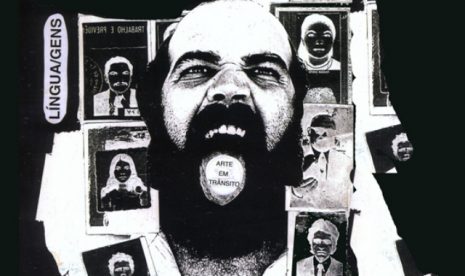
Foto: Paulo Bruscky
Lingua/gens: Tongue Performance 1996
© Konstnären och Galeria Nara Roesler
Mouth Shut, Loud Shouts is a new group exhibition at Stockholm’s Marabouparken that deals with questions of censorship and silencing deeply rooted in colonial regimes. The show will feature a reading room, which includes a selection of material from the Index on Censorship.
Mouth Shut, Loud Shouts have built a reading room to hold publications and material related to the exhibition, where attendees can spend time and read. A large part of the library is dedicated to Index on Censorship magazine, a global quarterly magazine, with reporters and contributing editors around the world. It was founded in 1972 by British poet and novelist Stephen Spender whose work focused on social injustice and class struggle. Alongside translator Michael Scammell they set up a magazine to publish the untold stories of dissidents behind the ‘Iron Curtain’ – the very first issue included a never-before-published poem, written while serving a sentence in a labour camp, by the Soviet dissident Aleksandr Solzhenitsyn, and just this year it published a story by Haroldo Conti, which had never before been published in English. From the beginning, Index declared its mission to stand up for free expression as a fundamental human right for people everywhere. It was particularly vocal in its coverage of the oppressive military regimes of southern Europe and Latin America, but was also clear that freedom of expression was not only a problem in faraway dictatorships, and focused its reporting on the different ways censorship and freedom of expression operates across the whole globe.
The collection of magazines are part of an archive loaned by the Bishopsgate Institute in London, an important space for the preservation of material on the labour, cooperative, free thought, protest and LGBTQ movements since 1895.
A series of posters, free to be taken away can be found here. These new works are connected to a project called The Klinik whose aim is to bring together artists and cultural workers to discuss cases in the censoring of artistic expression. Johanna Gustavsson and Felice Hapetzeder have produced two new posters that respond to Klinik workshops held in Stockholm in Autumn 2106. On the 16 September Belit Sağ, Secil Yayali and Felice Hapetzeder will hold public workshops exploring different forms censorship activating questions of how censorship operates in the arts in Stockholm.
In addition, there are a number of publications which relate to questions the exhibition touches upon and the exhibiting artists and their work.
About the exhibition
The suppression of speech, information, language and image is expansive and operates in different ways across the globe. Works within the exhibition present how censoring can operate as a mode of marginalisation and delegitimisaiton. Whilst some work directly opposes forms of state censorship, other works deal with pervasive embodied codes of self-censorship. Importantly the work looks to practices that transgress these modes of silencing and suppression, finding spaces, avenues and aesthetic forms that leak out voices to the world and ourselves.[/vc_column_text][/vc_column][/vc_row][vc_row][vc_column][vc_column_text]
When: Opens 15 September 2017
Where: Marabouparken, Löfströmsvägen 8, Sundbyberg. [email protected]
Tickets: Free
[/vc_column_text][/vc_column][/vc_row]
28 Jul 17 | Awards, Fellowship, Fellowship 2017, News and features, Turkey
[vc_row][vc_column][vc_single_image image=”89666″ img_size=”full” add_caption=”yes” alignment=”center”][vc_separator color=”black”][vc_column_text]Digital Activism award-winner Turkey Blocks continues to monitor internet freedom in Turkey. Since the Index on Censorship Freedom of Expression Awards, Turkey Blocks has expanded its use of NetBlocks, a programme which they use to track internet freedom and the flow of information online, as well as studying the impact of censorship.
Established in 2015, Turkey Blocks has served as a platform to monitor and report internet shutdowns using an open source tool it developed, which has been adopted by other organisations. With this tool, it has exposed 14 instances of mass-censorship.
Beyond monitoring internet freedom, Turkey Blocks has been campaigning using the information it gathered. According to founder Alp Toker, “We’ve put the spotlight on compliance by western corporations – elective censorship, withholding of content and geoblocking – particularly as it affects vulnerable communities in Turkey.” Staff have also been analysing the financial impacts of mass-censorship incidents. “Increasingly we find that economic criteria can succeed where human rights arguments are ignored,” Toker said.
Turkey Blocks is campaigning to make the internet more accessible from the policy side too, by gaining representation in bodies that define internet standards to “…ensure that human rights considerations are built into core infrastructure”, Toker told Index.
“The Freedom of Expression Award came at a time when Turkey faced unprecedented challenges to civil liberties and human rights. The recognition draws attention to our struggle to defend the online spaces citizens need to think freely and speak out,” Toker said. Index has connected Turkey Blocks with other human rights groups and communities that share similar goals of internet freedom.
Toker highlighted the Turkish government’s blocking of Wikipedia as a pressing concern for digital freedom in the country. Governments are unable to block individual pages, and on 29 April Turkey Blocks reported a full block of Wikipedia, which is ongoing. Toker calls this block “the ultimate act of digital self-harm…Turkish citizens are no longer able to edit articles with their own worldview; instead, they are left to watch from a distance as the international community picks up editorial control of Turkey’s history, culture and politics, defining the geopolitical narrative today and for generations to come.”
Moving forward, Turkey Blocks will work at using their measurement systems to empower ordinary citizens and independent media. “Our recent work has focused on bridging the terminology and requirements of the media freedom community with capabilities and expertise in the information security space,” Toker said.
“We’ve found that the mere act of systematic observation and record-keeping can discourage mass-censorship,” Toker told Index, so the team is working on scaling up to cover a wider geographic area, as well as pinpointing small disruptions.
From travelling and speaking at conferences, Toker emphasized that Turkey’s internet regulations are not that different from the rest of the world. “Our message on the international track is that the media freedom community needs to move faster to keep pace with innovation; it will be difficult, after all, to reclaim those spaces and win back those rights if we let go of them now.” He is adamant that digital rights are essential to other human rights, “Digital rights can seem abstract, even distant, in the context of Turkey’s national state of emergency, with ever-tightening restrictions around journalism and civil society. Yet none of those conversations can take place without a free and open internet. It’s important now, more than ever, to keep watch and to keep calling for more digital transparency and accountability from the authorities.
Additional reporting by Margaret Flynn Sapia[/vc_column_text][/vc_column][/vc_row][vc_row][vc_column][vc_basic_grid post_type=”post” max_items=”12″ style=”load-more” items_per_page=”4″ element_width=”6″ grid_id=”vc_gid:1503400925088-42244ba1-c62c-10″ taxonomies=”9034″][/vc_column][/vc_row]
27 Jul 17 | Awards, Fellowship, Fellowship 2017, News and features
[vc_row][vc_column][vc_single_image image=”89552″ img_size=”full” add_caption=”yes” alignment=”center”][vc_separator color=”black”][vc_column_text]Following the Index on Censorship Freedom of Expression Awards in April, journalism award-winner Maldives Independent has undergone a period of change and restructuring.
Former editor Zaheena Rasheed credits the award with increased press coverage outside of the Maldives. Most significantly, Rasheed told Index that the attention from the award convinced their sponsors to continue funding them.
After an Al Jazeera documentary containing interviews with Rasheed was released, the Maldives Independent’s office was attacked and raided by police in September 2016 and Rasheed had to flee for her safety. She has since taken a role at Al Jazeera in Doha, Qatar.
“The job has been very busy, but exciting, especially following a diplomatic crisis between Qatar and its neighbours,” Rasheed told Index.
In late April, Yameen Rasheed, a prominent blogger and journalist, who had contributed opinion pieces in the Maldives Independent, was murdered. His death is still on the minds of those at Maldives Independent, which extensively covered the investigation into his murder.
“Yameen was a critical and brave voice who spoke out against injustice despite the crackdown on free speech. His murder has had a chilling effect on free speech in the Maldives and prompted many others to practice self-censorship. I believe he was targeted by religious extremists because of his advocacy for a more tolerant and secular society”, Rasheed said. No information has been released on the identities of the suspects in Rasheed’s murder or what charges they might face.
Maldives Independent journalist Ahmed Rilwan disappeared in August 2014. Despite the international attention these incidents have received, Rasheed is not confident that they will affect the culture of impunity that exists around attacks on critics and freethinkers.
“The biggest concern, as evident by Yameen’s murder and Rilwan’s disappearance, is that there are groups who are willing to kill in the name of Islam. They enjoy impunity because they have the protection of state bodies. State officials support them for two reasons; they think supporting radical groups bolsters their legitimacy, or they also subscribe to these views” Rasheed said.
Rasheed identifies the Maldives Independent’s biggest challenge is securing consistent and sufficient funding, something which Maldives Independent is working on now. [/vc_column_text][/vc_column][/vc_row][vc_row][vc_column][vc_basic_grid post_type=”post” max_items=”12″ style=”load-more” items_per_page=”4″ element_width=”6″ grid_id=”vc_gid:1509444026808-19a50408-3e9b-3″ taxonomies=”9028, 4002, 9136″][/vc_column][/vc_row]
26 Jul 17 | Artistic Freedom, Events
[vc_row][vc_column][vc_column_text]Julia Farrington, associate arts producer at Index on Censorship, will be participating in the 2017 Arts Rights Justice Forum at the University of Hildesheim.
The ARJ Forum brings together international experts to discuss on understanding, protecting and defending freedom of expression and artistic freedom in relation to human rights and social justice.
Increasingly, we are seeing restrictions being placed on freedom of artistic creation, and specific threats are being made towards artists and defenders of human rights who are engaged in social transformation processes. This highlights the importance of considering artistic creativity and the role of artists in societies where human rights and freedoms are at risk.
This public forum will address the key issues on the topic of Arts Rights Justice:
- How to protect and ensure freedom of artistic expression in times of emerging censorship?
- To what extent do relocation and escape represent a strategy for threatened artists?
- How can international coalitions sustain artistic expression and ensure that artists are protected in their working environment?
Invited Speakers:
Farida Shaheed – Former UN special rapporteur in the field of cultural rights
Helge Lunde – International Cities of Refuge Network (ICORN)
Mary Ann DeVlieg – International Arts and Rights Advisors (IARA)
Todd Lanier Lester – Independent expert
Diana Ramarohetra – Artwatch Africa at Arterial Network
Julia Farrington – Index on Censorship
Meriem Bousselmi – Carthage Declaration on the Protection of Artists
Anna Steinkamp – Independent culture expert
Dr. Andreas Görgen – Directorate-General for Culture and Communication at the German Federal Foreign Office
Prof. Wolfgang-Uwe Friedrich – Professor of Political Science
& selected participants of the ARJ ACADEMY 2017
Additional information about the Arts Rights Justice Forum can be found here.[/vc_column_text][/vc_column][/vc_row][vc_row][vc_column][vc_column_text]
When: 31 August 2017 1pm-5:30pm
Where: Vertretung des Landes Niedersachsen beim Bund, Berlin
Tickets: Free. Registration required.
[/vc_column_text][/vc_column][/vc_row]
25 Jul 17 | Awards, Fellowship, Fellowship 2017, News and features
[vc_row][vc_column][vc_single_image image=”86271″ img_size=”full” alignment=”center”][vc_column_text]Since the Index on Censorship Freedom of Expression Awards in April, Arts fellow Rebel Pepper has continued to publish cartoons and speak out against the Chinese government on limits on freedom of expression. Index caught up with him to ask how he has progressed and how the fellowship has affected his work.
Wang Liming, aka Rebel Pepper, moved to Arlington, VA, and now works for Radio Free Asia. He had been living in Japan since 2014, where he was on holiday and forced to remain following fears that he would be arrested if he returned to China. Rebel Pepper told Index that the job offer from Radio Free Asia and the prospect of a steady income was appealing to him and his wife. “The degree of freedom between the United States and Japan is similar for me,” Rebel Pepper said.
Rebel Pepper told Index that he plans to stay in the United States for the long term because returning to China means certain arrest for him. For now, he and his wife are adapting to the new environment, language and culture. “I need time and patience to become familiar with all this,” he said.
Although he is now based in the United States, Rebel Pepper plans to continue his work, “as a political cartoonist, I still continue to speak out against the dark rule of the CCP,” he told Index by email. He attended an event on 4 June commemorating Tiananmen Square, along with the Inaugural China Human Rights Lawyers’ Day on 9 July. He continues to write his column in the Japanese version of Newsweek.
Index is working with Rebel Pepper to build a website which will feature his work. According to head of fellowship David Heinemann, Index is also giving Rebel Pepper guidance on digital security. With this platform and digital security training, Rebel Pepper will be able to reach fans in mainland China.
Rebel Pepper is pessimistic about the future of freedom of expression in China. “China has recently retreated to a darker era, continues to worsen and will eventually kill art, only propaganda – the so-called art can be survivor.” He believes the pursuit of freedom of expression in China is still important, saying “Liu Xiaobo’s death process has shown very clearly, why freedom of speech is so important.”
Rebel Pepper is one of many artists who has paid tribute to Liu Xiaobo, telling Index that his hope for non-violent protest in China is slim, and Liu Xiaobo’s death marks the end of the possibility of negotiating with the government. “Liu Xiaobo’s famous saying is ‘I have no enemies and no hatred.’ But the Communist Party of China proved that Liu was their enemy, all the Chinese were their enemies, and even their own internal cruel struggle.”
To the Chinese people, Rebel Pepper says “Please [be] ready to face the most evil king‘s rise, maybe you think it is the darkest era, but this is only the beginning.”
Additional reporting by Cassandra Allen[/vc_column_text][vc_basic_grid post_type=”post” max_items=”12″ style=”load-more” items_per_page=”4″ element_width=”6″ grid_id=”vc_gid:1501084370949-878e4c43-a2f0-0″ taxonomies=”9021″][/vc_column][/vc_row]
24 Jul 17 | Mapping Media Freedom, Media Freedom, media freedom featured, News and features, Turkey, Turkey Uncensored
[vc_row][vc_column][vc_column_text]
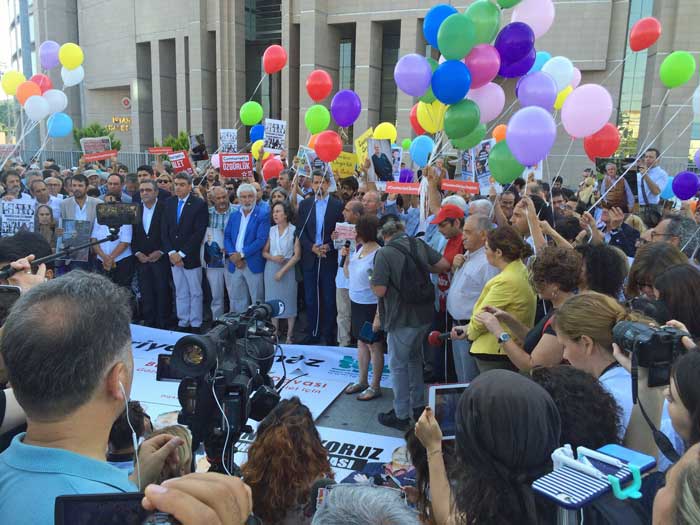
People gather in support of the Cumhuriyet defendants as the trial got underway.
Executives and columnists of Turkey’s critical Cumhuriyet daily go on trial this week, beginning Monday 24 July. The indictment seeks prison sentences for the defendants varying between 7.5 to 43 years. The charges for those on the board of the Cumhuriyet Foundation, which oversees the newspaper, include “abuse of power in office,” but all are accused of “supporting terrorist organisations” mainly through changes that have occurred in the paper’s editorial policy following the election of a new board to the foundation in 2013.
The prosecution’s claims are supported by views of several media experts — most of whom are former executives or employees terminated from various positions, according to Aydın Engin, a Cumhuriyet columnist who is also a defendant in the case although he was released pending trial due to his advanced age.
As Engin says “Cumhuriyet changed its editorial policy: this is the essence of the indictment.”
Indeed, the 435-page long document laments, page after page, that Cumhuriyet ditched its traditional, Kemalist, unyieldingly secularist and statist editorial policy and became a more open-minded newspaper.
The prosecutor states that by altering its editorial stance, the newspaper became a supporter of the so-called Fethullahist Terrorist Organization (FETÖ/PYD) — the name Turkish authorities give to the Fethullah Gülen network, which they say was behind last year’s coup attempt –, the Kurdistan Workers’ Party (PKK/KCK) and the Revolutionary People’s Liberation Party/Front (DHKP-C); three organizations with unrelated if not completely opposing worldviews.
“A newspaper changing its editorial policy cannot possibly be the subject of an indictment,” Engin says.
But did Cumhuriyet really change its editorial policy to legitimise the actions of FETÖ/PDY; PKK/KCK and DHKP/C as the prosecutor claims? “Every newspaper makes editorial policy changes as life unfolds. Cumhuriyet also did this. The paper caught up with the general tendencies in society such as increasing demand for freedoms, human rights and a stronger civil society.”
Engin says many of the witnesses who have testified against the Cumhuriyet journalists have been discredited as media professionals. “When I told the prosecutor that I will not respond to claims by people who have no reputation as journalists, he showed me a post by Professor Halil Berktay, who tweeted that ‘Cumhruiyet has become FETÖ’s media outlet.’ The prosecutor said, ‘This from a professor. Who are you to deny its validity?’
Engin: old and tired
Will any of the Cumhuriyet journalists be released at the end of this week? “I don’t even want to being to make any assumptions. This is not a legal trial; it is entirely political,” Engin replies, adding: “I strongly need them, personally, because I am 76 and tired,” says the energetic-looking journalist, who, as he speaks, is interrupted by someone asking him to sign a financial document. “See, I don’t even know what I just signed, I don’t know anything about these things.”
According to Engin, because those imprisoned are the key people to the newspaper’s operations, Cumhuriyet is now “half-paralyzed.”
But really, who are those in prison?
“Our brightest colleagues are in the can. Akın Atalay, is our CEO and I am a first-hand witness of how he has managed to keep the newspaper on its feet. Murat Sabuncu, he is perhaps one of the two or three finest journalists I know who can smell the news. He is publicly unheard of but Önder Çelik: he has been with Cumhuriyet for 35 years, he is the finest expert at things such as analyzing circulation reports, maintaining relations with printing houses; following paper prices..”
“I really need them to get out, but I don’t want to be dreaming.”[/vc_column_text][vc_row_inner][vc_column_inner][vc_separator color=”black”][/vc_column_inner][/vc_row_inner][vc_row_inner][vc_column_inner width=”1/2″][vc_custom_heading text=”Turkey” font_container=”tag:p|font_size:30|text_align:left” use_theme_fonts=”yes” link=”url:https%3A%2F%2Fmappingmediafreedom.org%2F|||”][vc_column_text]Index on Censorship monitors press freedom in Turkey and 41 other European area nations.
As of 24/07/2017, there were 496 verified reports of media freedom violations associated with Turkey in the Mapping Media Freedom database.[/vc_column_text][/vc_column_inner][vc_column_inner width=”1/2″][vc_single_image image=”94623″ img_size=”full” onclick=”custom_link” link=”https://mappingmediafreedom.org/#/”][/vc_column_inner][/vc_row_inner][vc_row_inner][vc_column_inner][vc_separator color=”black”][/vc_column_inner][/vc_row_inner][vc_row_inner][vc_column_inner][vc_column_text]The journalists on trial for the first time on 24 – 28 July:
 Akın Atalay (Cumhuriyet Foundation Executive President; imprisoned since Nov. 12, 2016): Facing 11 to 43 years in prison for “helping a terrorist organisation while not being a member” and “abusing trust”
Akın Atalay (Cumhuriyet Foundation Executive President; imprisoned since Nov. 12, 2016): Facing 11 to 43 years in prison for “helping a terrorist organisation while not being a member” and “abusing trust”
Atalay graduated from İstanbul University Law School in 1985. He has acted as the founding member of a number of civil society organisations and his academic studies on press freedom and the law have appeared in a large number of academic journals and newspapers. Since 1993, he has represented Cumhuriyet columnists and reporters as legal counsel. Currently, he is the newspaper’s executive president.
 Bülent Utku (Cumhuriyet Foundation Board Member, attorney representing Cumhuriyet; imprisoned since Nov. 5, 2016). Facing 9.5 to 29 years in prison for “helping a terrorist organisation while not being a member” and “abusing trust”
Bülent Utku (Cumhuriyet Foundation Board Member, attorney representing Cumhuriyet; imprisoned since Nov. 5, 2016). Facing 9.5 to 29 years in prison for “helping a terrorist organisation while not being a member” and “abusing trust”
Utku has worked as an attorney for 33 years. Since 1993, he has worked as a lawyer for Cumhuriyet columnists and journalists. He is also a member of the Cumhuriyet Foundation’s Board of Directors.
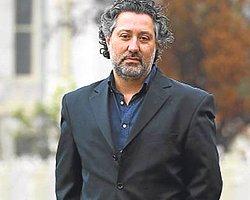 Murat Sabuncu (editor-in-chief, imprisoned since Nov. 5). Facing 7.5 to 15 years in prison for “helping a terrorist organisation while not being a member” [Turkish Penal Code (TCK) Article 314/2]
Murat Sabuncu (editor-in-chief, imprisoned since Nov. 5). Facing 7.5 to 15 years in prison for “helping a terrorist organisation while not being a member” [Turkish Penal Code (TCK) Article 314/2]
Sabuncu has been a journalist for 20 years. He started working at Cumhuriyet in 2014 as the newsroom coordinator. In July 2016, he took the helm as editor-in-chief.
 Kadri Gürsel (publications advisor, columnist, imprisoned since Nov. 5, 2015). Facing 7.5 to 15 years in prison for “helping a terrorist organisation while not being a member”
Kadri Gürsel (publications advisor, columnist, imprisoned since Nov. 5, 2015). Facing 7.5 to 15 years in prison for “helping a terrorist organisation while not being a member”
A journalist of 28 years, Gürsel started writing columns in Cumhuriyet in May 2016. He assumed the position of publications advisor for the newspaper in September 2016.
 Güray Öz (board member, news ombudsman, columnist, imprisoned since Nov. 5, 2015). Facing 8.5 to 22 years in prison for “helping a terrorist organisation while not being a member” and a single count of “abuse of power in office”
Güray Öz (board member, news ombudsman, columnist, imprisoned since Nov. 5, 2015). Facing 8.5 to 22 years in prison for “helping a terrorist organisation while not being a member” and a single count of “abuse of power in office”
Öz has been a journalist for 21 years. He has worked at Cumhuriyet since 2006. He is a columnist for the newspaper and has been its ombudsman since 2013. Öz is also on the board of directors of the Cumhuriyet Foundation.
 Önder Çelik (board member, imprisoned since Nov. 5, 2016). Facing 11.5 to 43 years in prison for “helping a terrorist organisation while not being a member” and four counts of “abuse of power in office”
Önder Çelik (board member, imprisoned since Nov. 5, 2016). Facing 11.5 to 43 years in prison for “helping a terrorist organisation while not being a member” and four counts of “abuse of power in office”
Önder Çelik has been a newspaper administrator for 35 years. He has worked as the print coordinator for the newspaper between 1981 – 1998. He returned to the same position in 2002 after a hiatus. He has been an executive board member since 2014 as well as a board member of the foundation.
 Turhan Günay (editor-in-chief of Cumhuriyet’s book supplement, imprisoned since Nov. 5, 2016). Facing 8.5 to 22 years for “helping a terrorist organisation while not being a member” and a single count of “abuse of power in office”
Turhan Günay (editor-in-chief of Cumhuriyet’s book supplement, imprisoned since Nov. 5, 2016). Facing 8.5 to 22 years for “helping a terrorist organisation while not being a member” and a single count of “abuse of power in office”
A journalist for 48 years, Günay has been with Cumhuriyet since 1987. For the past 25 years, he has worked as the chief editor for Cumhuriyet’s literary supplement, the country’s longest running weekly publication on books. The indictment insists he is a board member of the foundation; although he isn’t; a fact he reiterated in his testimony to the prosecutor.
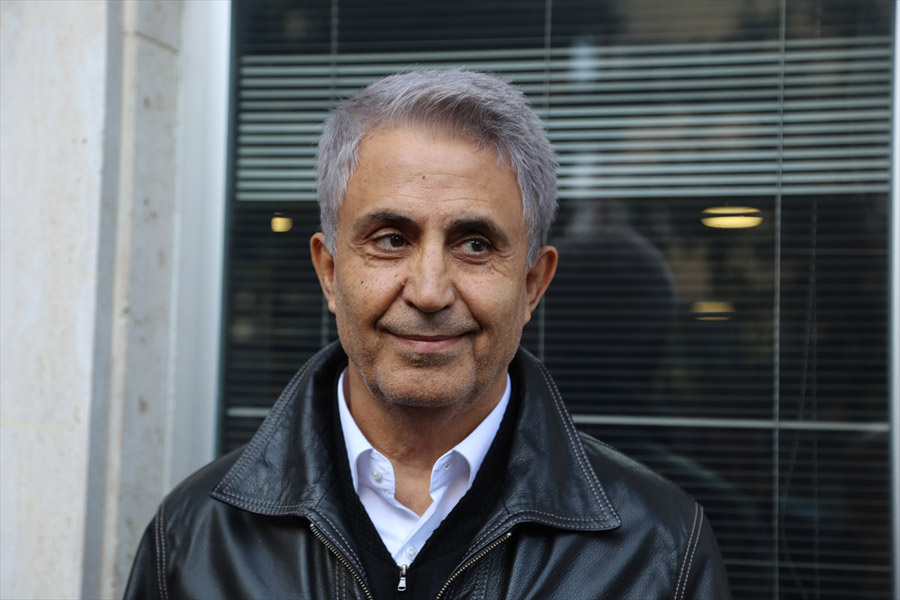
Musa Kart
Musa Kart (Cartoonist, board member, imprisoned since Nov. 5, 2016) Facing 9.5 to 29 years in prison for “helping a terrorist organisation while not being a member” and “abusing trust”
Musa Kart, one of Turkey’s most renowned cartoonists, has been drawing political cartoons for 33 years. He has been a Cumhuriyet journalist since 1985. For the past six years, Kart has drawn the front-page cartoons for Cumhuriyet.
 Hakan Karasinir (board member, imprisoned since Nov. 5). Facing 9.5 to 29 years in prison for “helping a terrorist organisation while not being a member” and two counts of “abuse of power in office”
Hakan Karasinir (board member, imprisoned since Nov. 5). Facing 9.5 to 29 years in prison for “helping a terrorist organisation while not being a member” and two counts of “abuse of power in office”
Hakan Karasinir has been a journalist for 34 years. He has been with Cumhuriyet for 34 years. In the past he has held various editorial positions, including serving as the newspaper’s managing editor between 1994 and 2014. Since 2014, he has also written columns in the newspaper.
 Mustafa Kemal Güngör (attorney, board member, imprisoned since Nov. 5, 2016). Facing 9.5 to 29 years in prison for “helping a terrorist organisation while not being a member”; two counts of “abuse of power in office”
Mustafa Kemal Güngör (attorney, board member, imprisoned since Nov. 5, 2016). Facing 9.5 to 29 years in prison for “helping a terrorist organisation while not being a member”; two counts of “abuse of power in office”
Mustafa Kemal Güngör has been a lawyer for 31 years. He has defended Cumhuriyet journalists and columnists in court since 2013.

Can Dundar
Can Dündar (former editor-in-chief of Cumhuriyet, currently resides abroad). Facing 7.5 to 15 years for “helping a terrorist organisation while not being a member”
Perhaps the most internationally famous of all Cumhuriyet defendants, Can Dündar was the editor-in-chief of Cumhuriyet until August 2016. He was arrested in November 2015 after Cumhuriyet published footage suggesting that the Turkish government sent weapons to armed jihadi groups in Syria. He was released in February 2016, a few months after which he moved to Germany where he currently resides.
 Orhan Erinç (Cumhuriyet Foundation Board President, columnist). Facing 11.5 to 43 years in prison for “helping a terrorist organization while not being a member” ; four counts of “abuse of power in office”
Orhan Erinç (Cumhuriyet Foundation Board President, columnist). Facing 11.5 to 43 years in prison for “helping a terrorist organization while not being a member” ; four counts of “abuse of power in office”
Veteran journalist Orhan Erinç, who worked for Cumhuriyet as a young reporter, returned to the newspaper in 1993 as its publications advisor. For nearly half a decade, Erinç also held the position of vice president at Turkish Journalists’ Association. He is also a columnist for Cumhuriyet.
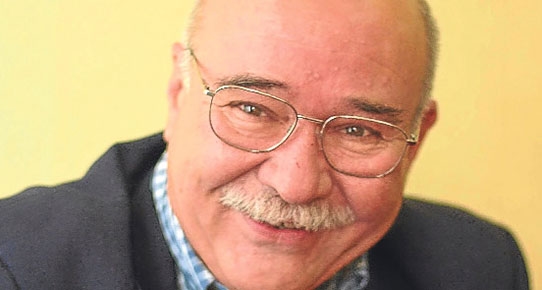 Aydın Engin (columnist, released under judicial control measures). Facing 7.5 to 15 years in prison for “helping a terrorist organization while not being a member”
Aydın Engin (columnist, released under judicial control measures). Facing 7.5 to 15 years in prison for “helping a terrorist organization while not being a member”
Cumhuriyet columnist Aydın Engin has been a journalist since 1969. He has participated in the founding process for many news outlets, including Turkey’s Birgün daily. He worked as a columnist and reporter for Cumhuriyet between 1992 and 2002. He returned to the newspaper in 2015.
 Hikmet Çetinkaya (columnist, board member, released under judicial control). Facing 9.5 to 29 years in prison for “helping a terrorist organisation while not being a member”; two counts of “abuse of power in office”
Hikmet Çetinkaya (columnist, board member, released under judicial control). Facing 9.5 to 29 years in prison for “helping a terrorist organisation while not being a member”; two counts of “abuse of power in office”
Çetinkaya has been with Cumhuriyet for three decades. In the past, the columnist worked as the İzmir Bureau Chief of the newspaper. He was also tried in 2015 along with Cumhuriyet columnist Ceyda Karan for reprinting the Charlie Hebdo cartoons in his column.
 Ahmet Şık (Correspondent, imprisoned since Dec. 30, 2016). Facing 7.5 to 15 years in prison for “helping a terrorist organisation while not being a member”
Ahmet Şık (Correspondent, imprisoned since Dec. 30, 2016). Facing 7.5 to 15 years in prison for “helping a terrorist organisation while not being a member”
No stranger to Turkish prisons, Ahmet Şık worked as a reporter for Cumhuriyret, Evrensel, Yeni Yüzyıl, Nokta and Reuters between 1991 and 2007. He remained in prison for a year in 2011 in an investigation about a shady gang called Ergenekon, believed to be nested within Turkey’s state hierarchy. He is known as one of the most vocal critics of the Fethullah Gülen network.
 İlhan Tanır (former Washington correspondent, resides abroad). Facing 7.5 to 15 years in prison for “helping a terrorist organisation while not being a member”
İlhan Tanır (former Washington correspondent, resides abroad). Facing 7.5 to 15 years in prison for “helping a terrorist organisation while not being a member”
İlhan Tanır previously reported from Washington for Cumhuriyet. His reports and analyses have appeared in many national and international publications. He currently resides in the United States.
 Bülent Yener (Finance Manager). Facing 7.5 to 15 years in prison for “helping a terrorist organization while not being a member”
Bülent Yener (Finance Manager). Facing 7.5 to 15 years in prison for “helping a terrorist organization while not being a member”
A former financial affairs manager with Cumhuriyet, Bülent Yener was released after one day in custody.
Günseli Özaltay (Accounting Manager). Facing 7.5 to 15 years in prison for “helping a terrorist organization while not being a member”
Günseli Özaltay, the newspaper’s accounting manager, was released after one day in custody.[/vc_column_text][/vc_column_inner][/vc_row_inner][vc_basic_grid post_type=”post” max_items=”12″ style=”load-more” items_per_page=”4″ element_width=”6″ grid_id=”vc_gid:1500894514864-6349d62e-4ed7-3″ taxonomies=”8607″][/vc_column][/vc_row]
21 Jul 17 | Campaigns -- Featured, Statements
[vc_row][vc_column][vc_column_text]
The Global Network Initiative, of Index on Censorship is a participant, notes the decision by the French courts to refer the global internet search de-listing case to the Court of Justice of the European Union.
” This important case raises complex issues related to internationally protected rights to freedom of expression and privacy, and the ability of governments to assert jurisdiction beyond borders. We hope the Court will take the opportunity to carefully the consequences for human rights – not just in Europe, but around the world,” said Mark Stephens, CBE., GNI Independent Board Chair and international human rights lawyer.
“We are concerned that if a single jurisdiction can mandate the global removal of search information it sends a message to all governments – authoritarian and democratic – that they each can reach beyond their borders and restrict access to content which is perfectly lawful in other jurisdictions,” Mr. Stephens said.
“The unintended consequences for global delisting include countries passing laws that restrict global access to information such as criticism of leaders and governments, and content relating to religious and ethnic minorities, LGBT people and women’s health, ” he said.
In March 2016, Google appealed the ruling of the Commission Nationale de L’Informatique et des Libertes (CNIL), which requires that search results deemed subject to the “Right to be Forgotten” be blocked not just across the European Union, but globally.
GNI has been long concerned that a global de-listing mandate sets a disturbing precedent for the cause of an open and free internet, with consequences for global access to information and freedom of expression, including for journalists, academics and historians.
Index on Censorship has and will remain opposed to calls for global delisting of search results, calling the so-called right to be forgotten “a blunt instrument ruling that opens the door for widespread censorship”.[/vc_column_text][/vc_column][/vc_row][vc_row][vc_column][vc_basic_grid post_type=”post” max_items=”12″ style=”load-more” items_per_page=”4″ element_width=”6″ grid_id=”vc_gid:1500650961804-f6170a94-c2b4-2″ taxonomies=”3211″][/vc_column][/vc_row]
21 Jul 17 | Bahrain, Middle East and North Africa, News and features
[vc_row][vc_column][vc_column_text]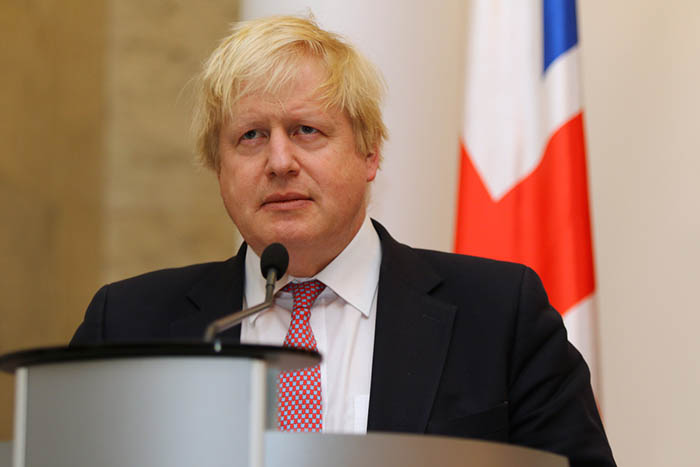
Index on Censorship welcomes UK foreign secretary Boris Johnson’s interest in human rights. The UK Foreign and Commonwealth Office’s 2016 Annual Human Rights Report, released on Thursday 20 July, highlights the UK’s work to promote human rights around the world and sets out a list of 30 “Human Rights Priority Countries”, including Bahrain, Iran, Russia and Saudi Arabia.
In the report preface, Johnson writes: “Human rights are not inimical to development and prosperity; the opposite is true. Freedom of speech, freedom of association, freedom to practice whatever religion you want and live your life as you please, provided you do no harm, are the essential features of a dynamic and open society.”
Index agrees wholeheartedly and acknowledges that the report features many valiant efforts, including, for the first time, a section dedicated to modern slavery – a top priority for the UK government.
But the report – issued on “take out the trash” day, the last of the parliamentary sessions before a seven-week recess – does not, as it claims, seem to aspire to the “passionate advocacy” of Charles James Fox, the British Whig statesman and anti-slavery campaigner.
Instead, Johnson offers a watered-down endorsement of human rights and his department’s understanding of advocacy is seriously flawed. To borrow the foreign secretary’s own words, this is “unthinkable for anyone inspired by the example of Charles James Fox”.
Take Bahrain, for example. While the report does go some way to criticising a handful of the country’s human rights violations, this is not done not in nearly strong enough terms, and you’d be forgiven for thinking these violations are blips in an otherwise rosy picture. This is, after all, a country which has only “restricted some civil liberties”.
“There was a mixed picture on human rights in Bahrain in 2016,” the discussion of the Persian Gulf kingdom begins. “Compared with the region, Bahrain remains progressive in women’s rights, political representation, labour rights, religious tolerance and institutional accountability.”
Firstly, this is a faulty comparison. Looking at the region as a whole serves only to make Bahrain look better than it actually is. Bahrain may have 15% representation of women in parliament, as the report highlights, but this cannot be described as progressive. As of 2014, the government of Saudi Arabia, not known for its feminism, was made up of 19.9% women.
In April 2016, a royal decree that increased the rights of women in Bahrain only passed through parliament scrutiny on a technicality. In March of that year, Bahrain detained human rights activist and blogger Zainab al-Khawaja along with her one-year-old son. She was released in May but fled the country out of fear of re-arrest.
While the report does go on to criticise the dissolving of the country’s main Shia opposition party, Al Wefaq, it remains a mystery why the report would first highlight political representation and religious tolerance as positives in Bahrain.
The country certainly does not have enough institutional accountability, and this is not something it should be commended on.
Even the brief mention of Bahraini human rights activist Nabeel Rajab, sentenced to two-years in prison just for speaking to journalists 10 days before the government’s report was released, only refers to Index award-winner as having been arrested. The sheer scale of Rajab’s case is not accounted for.
On 3 February a coalition of 21 groups and individuals, including Index on Censorship, urged Johnson to call for Rajab’s release. In the time since, the US state department has called for Rajab’s release and condemned his sentencing. The UK government so far has only “voiced its concern” in the weakest possible terms, and as yet has not acknowledged Rajab’s sentencing.
When Theresa May became prime minister of the UK, Bahrain was one of the first countries she visited. As new documents reveal, UK contractors visited the country 28 times in 12 months amid Bahrain’s ongoing human rights crackdown. In all, “UK government contractors have spent more than 650 days in Bahrain training prison guards, including officers at the notorious Jau prison where death-row inmates are held and allegedly tortured,” the Middle East Eye reported earlier this month.
The UK government appears to be in no position to heap praise on Bahrain for strengthening the rule of law, justice reform, its independent human rights institutions, prisoners’ rights and improvements at Jau.
Many more issues in the Annual Human Rights Report must be scrutinised when MPs return in September. If the Bahrain section is anything to go by, the report should be found to fall far short of being “passionate” about human rights.
[/vc_column_text][/vc_column][/vc_row][vc_row][vc_column][vc_basic_grid post_type=”post” max_items=”4″ element_width=”6″ grid_id=”vc_gid:1500646119465-139983e0-dcda-4″ taxonomies=”716″][/vc_column][/vc_row]
21 Jul 17 | Art and the Law, News and features
[vc_row][vc_column][vc_column_text]
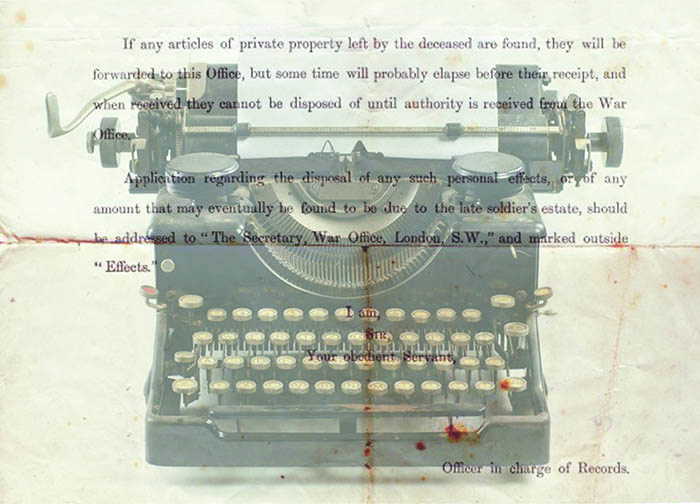
The flyer for masters student James Oberhelm’s banned artwork “Effects” [The Enthronement]
“Prevent is supposed to safeguard communities against the threat of terrorism, but the strategy is, in effect, counterproductive,” Melody Patry, Index on Censorship’s head of advocacy said. “The government should be encouraging discussions about how to counter radicalisation, but, in this case, it has clearly silenced the artist’s interrogation of extremism through his work.”
Oberhelm’s “Effects” [The Enthronement], which dealt with the geopolitics of the Middle East, was set to feature on the first day of the school’s Interim Show in May. It included two propaganda videos issued by Isis, one of which showed an execution carried out by the extremist group on the border between Syria and Iraq. As the emails state, this is “difficult imagery”.
Oberhelm acquired the films from the public domain and had planned for the work to feature several content warnings before showing the clips. An email from someone at GSA (the authors are redacted) on 10 April states: “I think this needs to be looked at by the Prevent Group.” The email goes on to say that the artwork “needs to be considered by the Head of School and with his line manager.”
Oberhelm says he was informed via email on 11 April that his work “is now going to be reviewed by the ‘Prevent Concerns Group.’” The group is “responsible for the strategic development and implementation of measures to meet the Prevent Duty”. His work was subsequently removed from the show.
Artist Bob and Roberta Smith spoke with Index about Oberhelm’s case: “Artists around the world are generally trying to do things that are permissible in democracies but sometimes not in their societies […] Artists must reserve the right to provoke society but that comes with risk and responsibility.”
What follows is a selection of emails made available by the Glasgow School of Art.
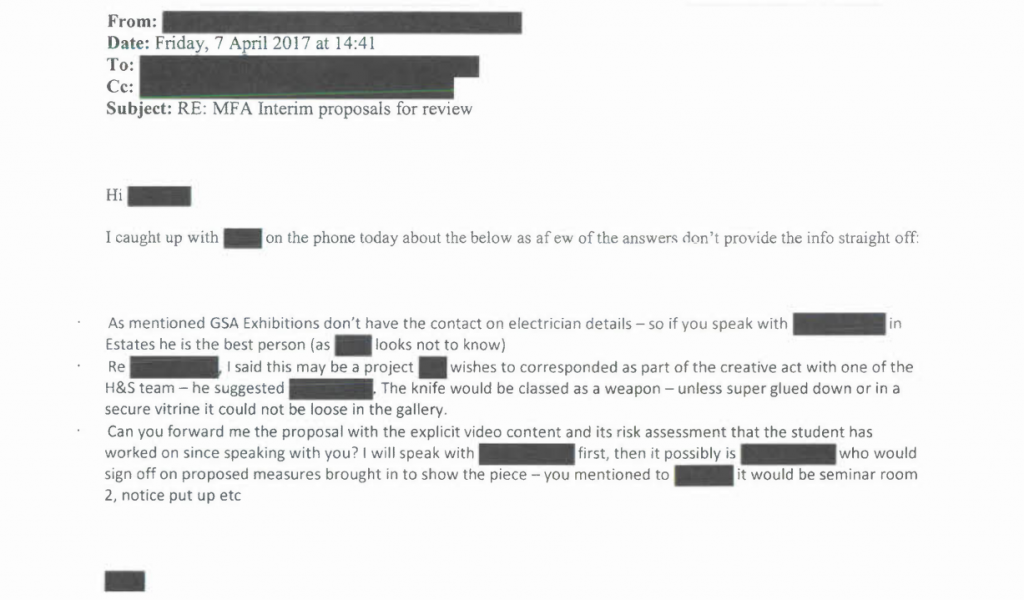
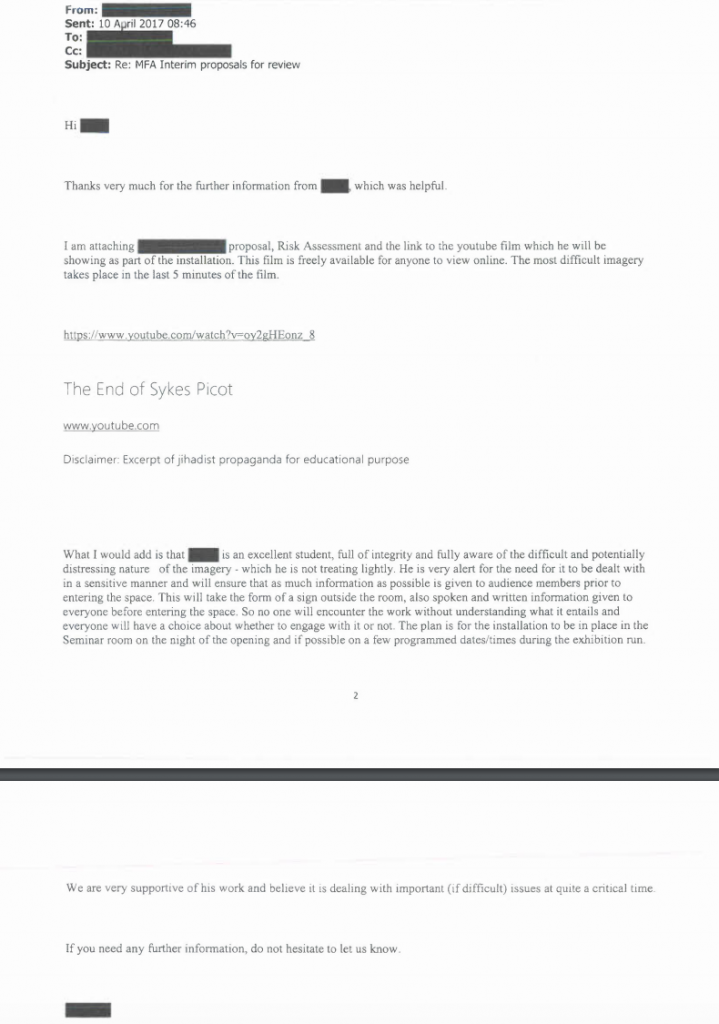
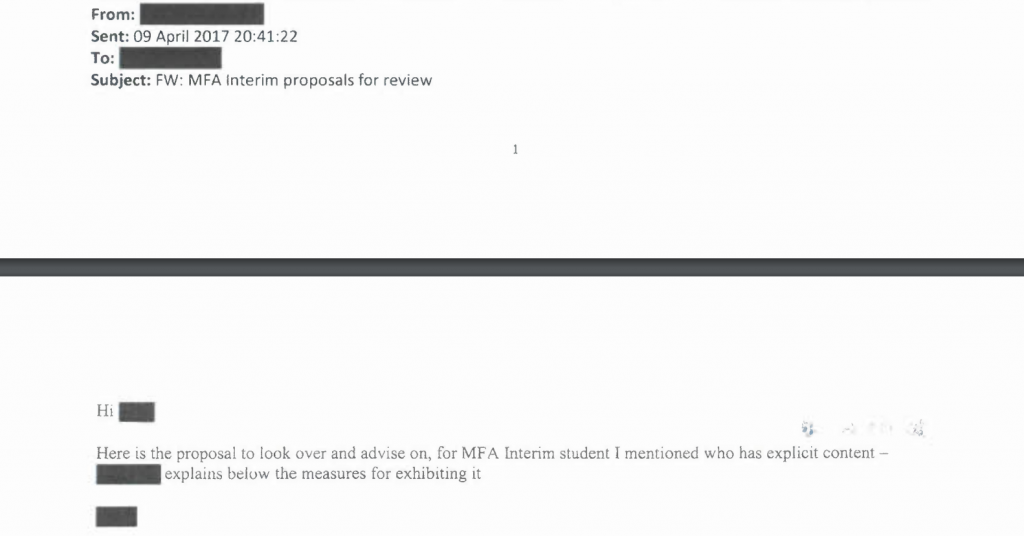
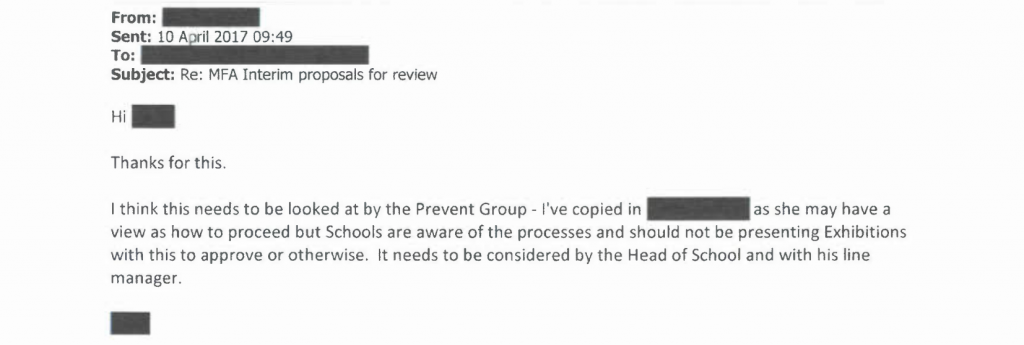

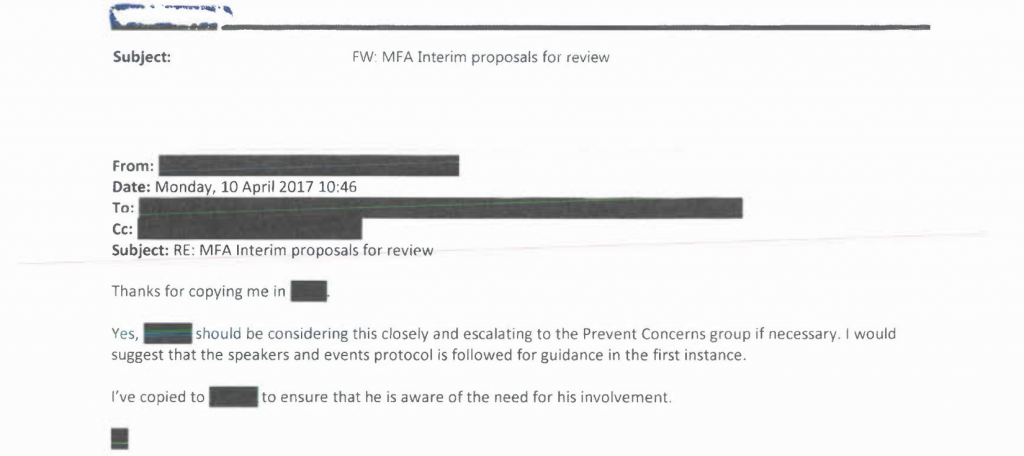 [/vc_column_text][/vc_column][/vc_row][vc_row][vc_column][vc_basic_grid post_type=”post” max_items=”4″ element_width=”6″ grid_id=”vc_gid:1500726862453-8472a316-b3bf-2″ taxonomies=”10100, 8883″][/vc_column][/vc_row]
[/vc_column_text][/vc_column][/vc_row][vc_row][vc_column][vc_basic_grid post_type=”post” max_items=”4″ element_width=”6″ grid_id=”vc_gid:1500726862453-8472a316-b3bf-2″ taxonomies=”10100, 8883″][/vc_column][/vc_row]




 Akın Atalay (Cumhuriyet Foundation Executive President; imprisoned since Nov. 12, 2016): Facing 11 to 43 years in prison for “helping a terrorist organisation while not being a member” and “abusing trust”
Akın Atalay (Cumhuriyet Foundation Executive President; imprisoned since Nov. 12, 2016): Facing 11 to 43 years in prison for “helping a terrorist organisation while not being a member” and “abusing trust” Bülent Utku (Cumhuriyet Foundation Board Member, attorney representing Cumhuriyet; imprisoned since Nov. 5, 2016). Facing 9.5 to 29 years in prison for “helping a terrorist organisation while not being a member” and “abusing trust”
Bülent Utku (Cumhuriyet Foundation Board Member, attorney representing Cumhuriyet; imprisoned since Nov. 5, 2016). Facing 9.5 to 29 years in prison for “helping a terrorist organisation while not being a member” and “abusing trust” Murat Sabuncu (editor-in-chief, imprisoned since Nov. 5). Facing 7.5 to 15 years in prison for “helping a terrorist organisation while not being a member” [Turkish Penal Code (TCK) Article 314/2]
Murat Sabuncu (editor-in-chief, imprisoned since Nov. 5). Facing 7.5 to 15 years in prison for “helping a terrorist organisation while not being a member” [Turkish Penal Code (TCK) Article 314/2] Kadri Gürsel (publications advisor, columnist, imprisoned since Nov. 5, 2015). Facing 7.5 to 15 years in prison for “helping a terrorist organisation while not being a member”
Kadri Gürsel (publications advisor, columnist, imprisoned since Nov. 5, 2015). Facing 7.5 to 15 years in prison for “helping a terrorist organisation while not being a member”  Güray Öz (board member, news ombudsman, columnist, imprisoned since Nov. 5, 2015). Facing 8.5 to 22 years in prison for “helping a terrorist organisation while not being a member” and a single count of “abuse of power in office”
Güray Öz (board member, news ombudsman, columnist, imprisoned since Nov. 5, 2015). Facing 8.5 to 22 years in prison for “helping a terrorist organisation while not being a member” and a single count of “abuse of power in office”  Önder Çelik (board member, imprisoned since Nov. 5, 2016). Facing 11.5 to 43 years in prison for “helping a terrorist organisation while not being a member” and four counts of “abuse of power in office”
Önder Çelik (board member, imprisoned since Nov. 5, 2016). Facing 11.5 to 43 years in prison for “helping a terrorist organisation while not being a member” and four counts of “abuse of power in office”  Turhan Günay (editor-in-chief of Cumhuriyet’s book supplement, imprisoned since Nov. 5, 2016). Facing 8.5 to 22 years for “helping a terrorist organisation while not being a member” and a single count of “abuse of power in office”
Turhan Günay (editor-in-chief of Cumhuriyet’s book supplement, imprisoned since Nov. 5, 2016). Facing 8.5 to 22 years for “helping a terrorist organisation while not being a member” and a single count of “abuse of power in office” 
 Hakan Karasinir (board member, imprisoned since Nov. 5). Facing 9.5 to 29 years in prison for “helping a terrorist organisation while not being a member” and two counts of “abuse of power in office”
Hakan Karasinir (board member, imprisoned since Nov. 5). Facing 9.5 to 29 years in prison for “helping a terrorist organisation while not being a member” and two counts of “abuse of power in office” 
 Orhan Erinç (Cumhuriyet Foundation Board President, columnist). Facing 11.5 to 43 years in prison for “helping a terrorist organization while not being a member” ; four counts of “abuse of power in office”
Orhan Erinç (Cumhuriyet Foundation Board President, columnist). Facing 11.5 to 43 years in prison for “helping a terrorist organization while not being a member” ; four counts of “abuse of power in office”  Aydın Engin (columnist, released under judicial control measures). Facing 7.5 to 15 years in prison for “helping a terrorist organization while not being a member”
Aydın Engin (columnist, released under judicial control measures). Facing 7.5 to 15 years in prison for “helping a terrorist organization while not being a member”  Hikmet Çetinkaya (columnist, board member, released under judicial control). Facing 9.5 to 29 years in prison for “helping a terrorist organisation while not being a member”; two counts of “abuse of power in office”
Hikmet Çetinkaya (columnist, board member, released under judicial control). Facing 9.5 to 29 years in prison for “helping a terrorist organisation while not being a member”; two counts of “abuse of power in office”  Ahmet Şık (Correspondent, imprisoned since Dec. 30, 2016). Facing 7.5 to 15 years in prison for “helping a terrorist organisation while not being a member”
Ahmet Şık (Correspondent, imprisoned since Dec. 30, 2016). Facing 7.5 to 15 years in prison for “helping a terrorist organisation while not being a member”  İlhan Tanır (former Washington correspondent, resides abroad). Facing 7.5 to 15 years in prison for “helping a terrorist organisation while not being a member”
İlhan Tanır (former Washington correspondent, resides abroad). Facing 7.5 to 15 years in prison for “helping a terrorist organisation while not being a member”  Bülent Yener (Finance Manager). Facing 7.5 to 15 years in prison for “helping a terrorist organization while not being a member”
Bülent Yener (Finance Manager). Facing 7.5 to 15 years in prison for “helping a terrorist organization while not being a member” 






 [/vc_column_text][/vc_column][/vc_row][vc_row][vc_column][vc_basic_grid post_type=”post” max_items=”4″ element_width=”6″ grid_id=”vc_gid:1500726862453-8472a316-b3bf-2″ taxonomies=”10100, 8883″][/vc_column][/vc_row]
[/vc_column_text][/vc_column][/vc_row][vc_row][vc_column][vc_basic_grid post_type=”post” max_items=”4″ element_width=”6″ grid_id=”vc_gid:1500726862453-8472a316-b3bf-2″ taxonomies=”10100, 8883″][/vc_column][/vc_row]